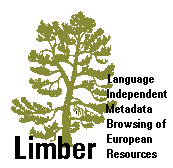LIMBER: breaking the language barriers
By Maria
Forsman June 15, 2000
A new EU-financed project has been launched by the European data
archives whose aim is to create tools for multilingual information
retrieval and storage on the Internet. The German, Greek, French,
Norwegian and British data archives participate in the project. As the
project progresses, information shall be passed also to other data
archives and interested parties in general.
The aim: to find research material
LIMBER (Language Independent Metadata Browsing of European
Resources) is a project where a multilingual interface is developed in
order to find material in the European social science data
archives.
In social science data archives there are data of interest to
researchers working in different countries. The LIMBER project
develops tools for multilingual information retrieval with the aim of
helping users find the material they need regardless of place and
language.
If the objectives set for the LIMBER project become realised,
researchers can in the near future make queries in the data archives'
joint database application NESSTAR in the language of their
choice
The objectives of the LIMBER-project are:
- To study and develop the metadata model and representation (in XML
and RDF) for social science datasets to allow their integration within
and across data archives;
- develop and evaluate a multilingual thesaurus to be used to index
and access social science datasets in data archives ;
- develop and evaluate a multilingual query and retrieval tool to
assist queries and allow queries to dataset archives to be made in
several languages in different data archives.
- develop and evaluate tools to support the construction and
maintenance of datasets using automatic indexing, and,
- evaluate an XML metadata server using social science datasets and
a metadata model created for the multilingual thesaurus.
Multilingual thesaurus
The basis for the compiling of a multilingual thesaurus, i.e., a
controlled index term list, is HASSET (Humanities and Social Science
Electronic Thesaurus) used by the UK Data Archive.
Translating HASSET into Finnish has been discussed since the
establishment of the FSD in 1999. In the Autumn 2000, the FSD starts a project
to sort out possibilities to translate HASSET into Finnish and/or in
one way or another join the LIMBER project.
A multilingual social science thesaurus contains many problems,
however, and it is important to discuss them. They are not
insurmountable but they must be taken into account.
Essential aspects are differences between cultures and countries,
i.e. in the educational system, social classes or practices in social
policy. In addition, regional changes and different age groups can
give reason to think. There are problems in the multi-layered
meanings of words, too; the Finnish word "tieto", for instance, can
mean "data", "information" or "knowledge" in English.
Theory of science or methodology may bring forth changes in
terminology. A new word may be introduced in the English speaking
scientific community whose content a Finnish sociologist fully
understands but to which there isn't yet a Finnish equivalent or an
established substitute.
World languages and small ones
In April, the UK Data Archive invited twenty experts from
different data archives to Essex to discuss these and other questions
connected with a multilingual thesaurus, information retrieval and
contents description. The FSD was represented in the LIMBER workshop
by Maria Forsman and Arja Tuuliniemi.
One of the visions for the future in the LIMBER workshop was "ELSST",
European Language Social Science Thesaurus. In addition to being a
multilingual tool in description and retrieval of data in different
data archives, it would also serve a broader purpose, in content
description and retrieval of social science data on the Internet.
When assessing the prospects of the thesaurus, also the joint
EU-project of European virtual libraries, RENARDUS, was discussed.
The Finnish Virtual Library is one of the participants in
it.

Image courtesy of LIMBER-project
Top of page | Privacy Policy
|